1) Dave Psychodrama Neighbour The first time South London artist Dave toured Canada, he passed through Toronto with his counterpart AJ Tracey, both of whom were just starting to break out of the South London music scene. This fall, coming off the back of his Mercury Prize-winning debut album Psychodrama, playing to a sold-out audience […]
Publishing date: Dec, 10, 2019
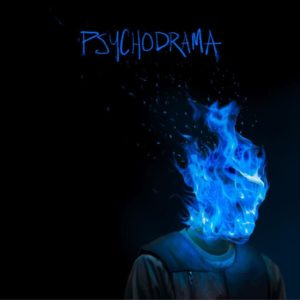
1) Dave
Psychodrama
Neighbour
The first time South London artist Dave toured Canada, he passed through Toronto with his counterpart AJ Tracey, both of whom were just starting to break out of the South London music scene.
This fall, coming off the back of his Mercury Prize-winning debut album Psychodrama, playing to a sold-out audience at the Phoenix Concert Theatre in Toronto, he balanced older high-energy tracks with his more introspective staples. Moving effortlessly from piano ballads like “Black” and “Hangman” to an a capella cover of his J Hus collaboration, “Disaster,” without a beat, he had no trouble engaging the crowd with his passionately-delivered confessional lyrics.
With hits under his belt, Dave could have easily reached for chart dominance on his debut, but instead he turned inwards. Psychodrama is insular, brooding, and deeply introspective; it demands to be listened to through headphones, all in one go. Dave weaves vivid stories about growing up in the South London ward of Streatham, navigating family life after his brother’s life sentence, and tells vivid cautionary tales inspired by his family members, former classmates and his formative years.
Psychodrama opens with the stripped-down “Psycho,” where Dave sets up the therapy concept that runs throughout the album and bares his emotional scars, quiet bravado and neighbourhood pride. The instrumental is a slow burn that never stops evolving. “Psycho” begins with twinkling piano keys and spacey, Enya like-vocals that get chopped to bits mid-track as Dave talks about “wanting to take a pretty woman for a test drive,” before the top end falls out entirely, leaving only a raw sub-bass and a piano as he opens up about the “manic depression” he struggles with when the cameras are off.
The sonic and emotional tones Dave establishes in the opener are consistent throughout much of the rest of the album. “Streatham” begins with eerie, reversed vocals, which get washed out as Dave paints a vivid picture of his South London neighbourhood, where “[he] used to roll ‘round all stupid, Mitcham Lane, that’s Streatham and Tooting.”
On “Screwface Capital,” Dave breaks down how London eats its own alive, and how his “location changes quicker than gears on a brand new Porsche Cayman.” His therapist’s recorded voice flits in and out throughout the album, affirming Dave’s reflections and the lessons he’s absorbed from those around him.
Psychodrama’s emotional centerpiece is the eleven-minute “Leslie,” on which Dave uses the sweeping orchestral backtrack to tell a cautionary tale about a pregnant woman’s attempts to escape her abusive, violent relationship. Revelatory as ever, Dave later mentions on the outro – “Drama” – that the story in “Leslie” is based on the real-life experiences of his close family members.
Although Dave’s reached popstar status in the U.K., he’s not tempering his voice to be more palatable to the island state’s masses. Take the lead single “Black,” for example, which features the lyrics: “The blacker the berry the sweeter the juice/ A kid dies, the blacker the killer, the sweeter the news.” Dave uses the slow-moving piano ballad to speak about universal traumas inflicted on black youth across the diaspora, while celebrating the unyielding solidarity and community forged by those shared experiences.
• Isaac Nikolai Fox
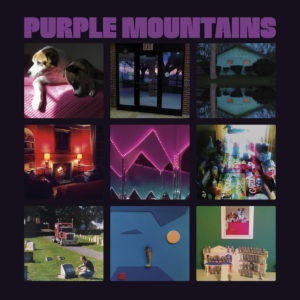 2) Purple Mountains
2) Purple Mountains
Purple Mountains
Drag City
“The end of all wanting / is all I’ve been wanting,” David Berman sings in the chorus of “That’s Just the Way I Feel,” the opening cut on Purple Mountains.
It’s a gut-wrenching, perfectly constructed line, delivered half-time for emphasis; one of hundreds of perfectly-constructed lines across the 10 gorgeous, heartbreaking songs on this album.
Even if you’d never heard of David Berman and came to Purple Mountains devoid of context, the ache and struggle in his songwriting are unmissable. You don’t need a long relationship with the artist to fall for the charm of these bitterly funny tunes, smartly balanced by the bouncy, energetic lo-fi rock that his band — comprised of members from Brooklyn folk rock outfit, Woods — is cooking out behind the singer.
But people aren’t coming to Purple Mountains devoid of context. And the real ache and struggle, the real-life outcome, undercuts the set in a painful way that you can’t get away from. Berman killed himself in August of 2019, just a few months after this album came out.
“Honk if you’re lonely tonight / if you need a friend to get through the night,” Berman sang on American Water in 1998. For a lot of people he was that friend—someone with an unmatched gift to articulate complex internal pain in great songs, someone who was there when you needed to hear that you weren’t feeling these things alone.
Purple Mountains is his last honk: an incredible addition to a one-of-a-kind songbook, but one that will always be haunted by the wanting—and the end—in that opening cut chorus.
• Andrew Wedderburn
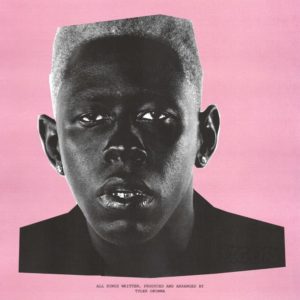 3) Tyler The Creator
3) Tyler The Creator
IGOR
Columbia
In case you have been living under a rock, it is Tyler, the Creator’s world and we are just living in it. The Los Angeles rapper’s dynamic, genre-breaking fifth studio album IGOR was one of the most highly regarded projects of the year and once again raised the bar for what is possible for a solo artist. Entirely written and produced by himself, the 12-track project is a carefully crafted yet revealing exploration of his identity, queerness and unnamed romantic love interest – but things take a turn for the worse when the guy’s ex-girlfriend gets involved. Donning a blond wig and dark glasses, Tyler once again invents a new alter-ego (this time heavily influenced by the Gothic lab assistant archetype of “Igor”) and takes the listener on an immersive trip through the perfect mess of rap, funk and R&B that inhabits his mind. Narrated by American comedian Jerrod Carmichael and backed by a slew of contributors like Kanye West, Playboi Carti, Solange, Pharrell and more, IGOR is simply put Tyler’s most impressive work to date and it is a pleasure to witness his artistry.
• Drew Yorke
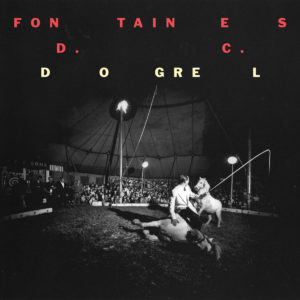 4) Fontaines DC
4) Fontaines DC
Dogrel
Partisan Records
When BeatRoute caught up with Dublin, Ireland’s Fontaines D.C. in September they were adamant about their quest to become one of the biggest bands in the world.
While they may not have achieved U2 or Rolling Stones status yet, their debut album, Dogrel, packs equal bark and bite, connecting their socio political views to the rest of the world through a tightly wound collection of post punk poetry.
The album was nominated for the 2019 Mercury Prize, the UK’s most coveted music award, and pushed the band into working even harder towards their goal of greatness, spending most of the year on the road. At one point, they even had to cancel a significant string of tour dates due to exhaustion.
Fontaines possess a unique shuffle and swagger to their delivery and when frontman Grian Chatten cycles through his rolodex of influences that include Ian Curtis, Gang of Four and Wire crossed with their post punk contemporaries like Girl Band and Shame, there’s something special that happens and you can actually feel a beating heart at the core of each track.
From the the anthemic “Boys In The Betterland,” to the sensitive and hypnotic “Television Screens,” and the barroom ballad closer, “Dublin City Sky,” the young quintet have created a powerful bridge from their discontent in Dublin to music fans all over and they’ve got everyone dancing in the process.
• Glenn Alderson
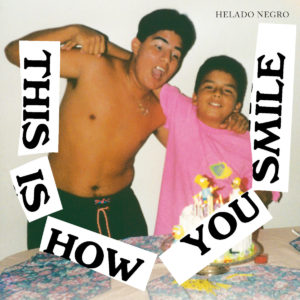 5) Helado Negro
5) Helado Negro
This Is How You Smile
RVNG Intl.
Roberto Carlos Lange pulls from his boundlessly creative arsenal and presents us with This Is How You Smile, a mingle of lo-fi audio experimentals, swervy electro-synth, and the hypnotics of his own sweet voice, signed off under the moniker Helado Negro.
There are harsh truths in Lange’s sixth album; born to Ecuadorian parents and living in the socio-political turmoil of present-day America, the stories he weaves through Smile bear witness to the everyday tragedies and psychological anguish around immigration and displacement. But this musical masterpiece—and that it is—utilizes hope as an axis from which to gently, daringly subvert such matters. Visibility. Identity. Self-love. Kindness.
The sensorial journey begins with the tender “Please Won’t Please;” Lange’s sleepy voice ruminates on brown skin, bittersweet. He cocoons you in warm guitar strums and reminds you that it’s okay. Lange’s love of experimenting with sound—he records constantly with his iPhone and infuses his music with everyday sounds—comes to life in collages such as the closing track “My Name Is for My Friends,” which incorporates recordings of an Abolish ICE march and kids playing in his friend’s living room.
Smile is bilingual, like Lange. The ambling “País Nublado,” features both English and Spanish, with dreamy backup vocals providing relief to fears of a politically “cloudy country.” The melodic, recursive “Running” urges slowing down for its simple beauty.
An ambient, spectral quality reverberates throughout Smile. It is a lifeboat in a stormy sea, a synth-induced meditation for, as Lange croons in “Seen My Aura,” “sitting with the sky.”
• Dayna Mahannah
 6) FKA twigs
6) FKA twigs
MAGDALENE
Young Turks
Her first full length album since LP1 (2014) and the first release of any kind since the incredible M3LL155X EP (2015), FKA twigs’ MAGDALENE was a long-awaited release that bears the weight of our society in these uncertain times.
By placing herself in direct lineage with a complex Biblical figure, twigs demonstrates the pressure, erasure and demonization of women throughout history. And although a somewhat typical figure for an avant-garde artist, the long misrepresented Magdalene acts as a vessel to speak on current truths: the difficulty of keeping ourselves afloat amid society’s seething pressures.
Continuing on the experimental R&B wave she first charted in 2014, MAGDALENE is a perfectly crafted story arc. Opening with “Thousand Eyes,” twigs’ vocals cascade like a holy choir of archangels; “Sad Day” builds omnisciently, mimicking the rise and fall of a battle. The album peaks with “Fallen Alien” and slowly crumbles into a quiet demise, with “Daybed” acting as the comedown. The final track “Cellophane” leaves listeners hanging in the balance with haunting vocals and sharp vulnerability.
MAGDALENE is FKA twigs at her best, delivering a cinematic narrative of love, loneliness, pain, illness, and recovery, with an underlying sense of hope.
• Jessica D’Angelo
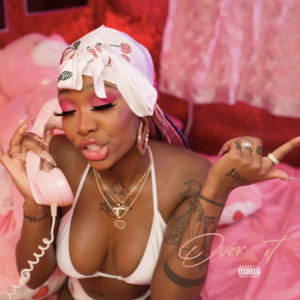 7) Summer Walker
7) Summer Walker
Over It
LVRN/Interscope
“Am I really that much to handle?”
Playful yet introspective, the opening lyrics of “Over It” sets the tone for the debut album of the same name that has taken Atlanta native Summer Walker from exotic dancing and cleaning houses to the top of the Billboard charts in less than two years.
While Over It has all the accolades to prove just how great of an album it is—including the biggest debut album for an R&B female artist in over 10 years, and the largest-ever streaming week for a female R&B artist—this is an album that represents one of the rare moments that the mainstream and “the culture” are in agreeance at the exact same time.
While the “fell in love with a stripper” trope in rap and R&B is nothing new, Walker is perhaps the first artist to give the other side of the story. Aided by productions from lauded trap producer and current boyfriend, London on Da Track, Over It is a masterful sonic mix of 90s R&B nostalgia with Southern strip club vibes—the perfect canvas for Walker’s laments on love, heartbreak and womanhood. And in case you were wondering, the two met at a strip club Walker was working at over four years ago, naturally.
Summer Walker has hinted that she might retire from music soon as a result of her social anxiety and painful shyness, but here’s to hoping that she’s not Over It and this is just the beginning.
• Josephine Cruz
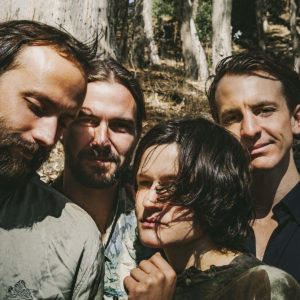 8) Big Thief
8) Big Thief
Two Hands
4AD
Big Thief stole the spotlight in 2019 by releasing two albums that, rooted by the band’s philosophical inquiries, branch off into distinct sonic realms.
Where U.F.O.F. (Unidentified Flying Object Friend) leans on lush production and eerie samples to invoke the cosmos, Two Hands relies on few takes and minimal overdubs to strip their sound to its barest bones. The two projects, nicknamed “The Celestial Twin” and “The Earth Twin” span the reaches of outer space and upturn every rock on Earth to wonder about human connectedness and consciousness in complicated times.
Two Hands is more than its music. “Most of what we are as a band isn’t music, it’s our relationships and our friendships,” guitarist and lead singer Adrianne Lenker told BeatRoute. “The music is an expression of that—so the music only becomes what it does because of our relationships with each other.”
The album embodies the quartet’s ethos of raw vulnerability and radical coexistence. Lenker’s vocals quiver with intimacy and the live takes prioritize passion over perfection. On emotional centrepiece “Not,” Lenker has said they played as if their hair was on fire. Invoking the desert clime of the El Paso studio where they recorded, the whole album feels burnt to a crisp.
Big Thief masterfully conflate the personal with the political without ever pandering or pontificating. Lenker’s lyrics blur the internal and external, peppering her stories with enough personal details as to invite listeners into a sense of shared experience. It’s an album to be lost and found in.
• Maggie McPhee
 9) Sunn O))
9) Sunn O))
Life Metal
Southern Lord
Sunn O))) have always been a band that’s existed in multitudes. For nearly two decades, the prolific experimental metal band from Seattle have depended on the magnitude of a single tone, of a single note, to do the heavy-lifting of scaffolding the thematic complexity of a track.
The songs on the band’s eighth studio album, Life Metal, unfold glacially, where the apex of rising action arrives at the speed of a slow-moving hurricane, unreachable, but vividly identifiable in the distance. It’s this devotion to embodying an unwavering and immovable foundation that’s made their work ripe for collaboration, and on Life Metal they’ve enlisted the help of an all-star cast of collaborators like Silkworm’s Tim Midyett and T.O.S. Nieuwenhuizen.
On album opener, “Between Sleipnir’s Breaths” Icelandic composer and cellist Hildur Guðnadóttir, provides vocals— tight, breathy, and firm—that unfurl prehistoric Aztec poems. Elsewhere, miscorophic and unmistakable chimes appear fleetingly in the opening notes of “Troubled Air,” before rose-toned organs float to the top of an immaculate drone.
It’s evidence of their ability to balance seismic power with a remarkable ear for levity. In moments like this, moments where they wrap a dense environment in a sliver of delicacy, they display a different articulation of force; this time through unaltered vulnerability, rather than the magnitude of noise.
They’ve cited Alice Coltrane as influence, which offers an easy throughline to decipher why bearing witness to Life Metal feels almost doctrinal in nature; something akin to an opaque pilgrimage that examines space, speed, and time as a powerful discursive tool.
• Melissa Vincent
 10) Billie Eilish
10) Billie Eilish
When We All Fall Asleep, Where Do We Go?
Darkroom/Interscope
When Billie Eilish debuted, we were met with a blonde, blue-eyed teen songstress who looked like an angel in gangster clothing. Since then, her sound has gotten darker and more defined, and both the critics and the masses can’t seem to get enough.
In the follow-up to 2017’s Don’t Smile At Me EP, Eilish shows off the range in her voice and musical influences with her first album When We All Fall Asleep, Where Do We Go?—a somber pop effort with ballads, bass, trap and electronic beats.
During the week of August 24, 2019 the single “bad guy” hit the #1 spot on the charts, ending the 19-week streak of Lil Nas X’s “Old Town Road.” This also made Eilish the first artist born in the 2000s to top the Billboard Hot 100. Other standout tracks include “when the party’s over,” “bury a friend,” and “my strange addiction.”
In a rarity for pop music in 2019, all of Eilish’s songs are written and produced by herself and her brother Finneas O’Connell. The pair have since transcended their Soundcloud roots to incorporate acoustic elements into their music: ominous vocal processing, field recordings, synths, whispers and close breathiness trigger an almost sensory (ASMR) experience. Eilish is tough-talking but soft sung, delivering nightmarish lyrics floating on dreamy harmonies.
Early in her career, Eilish has realized a balance between critical and commercial success, a dream for any artist. Enough has been said about her youthful edge but she truly channels the digital zeitgeist with this album. As she takes us deeper into the shadowy expanse of her mind, her star will surely only burn brighter.

